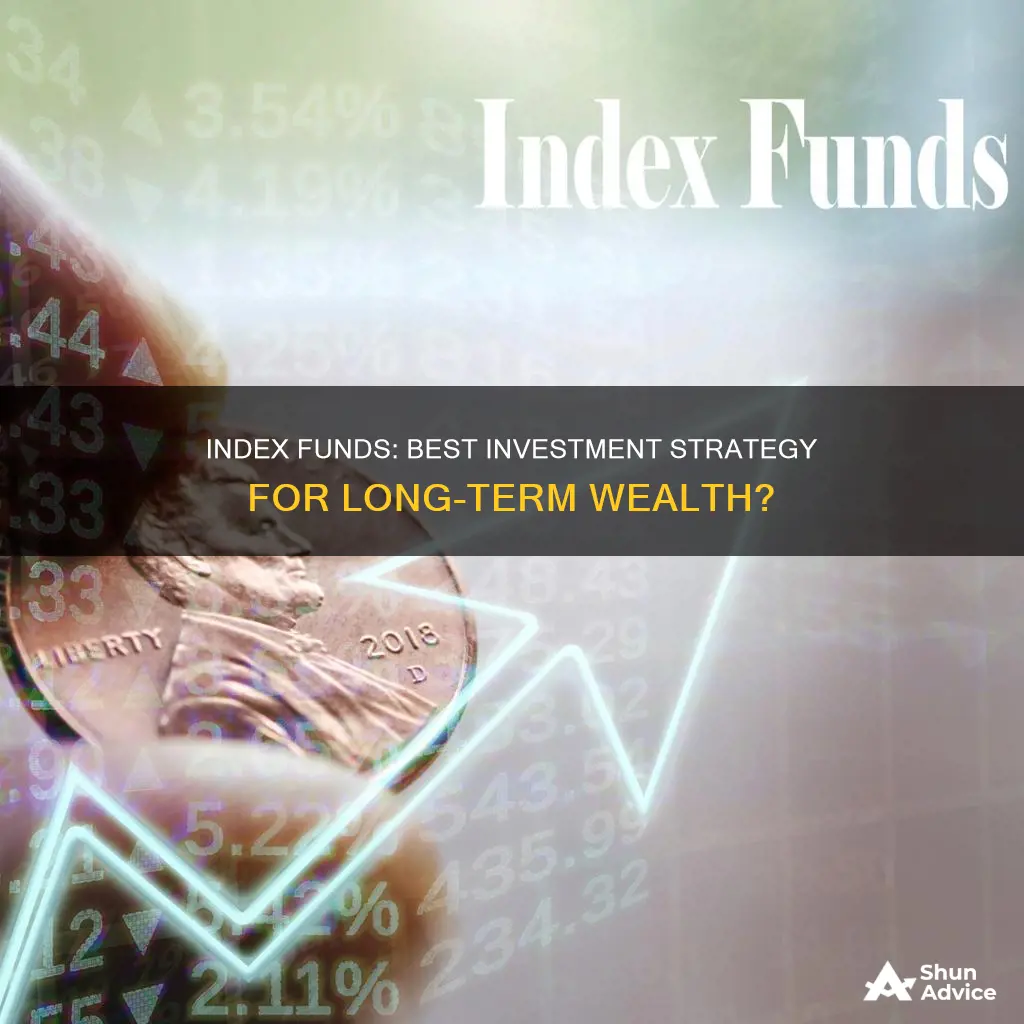
Index funds are a type of investment fund that tracks the performance of a market index, such as the S&P 500, by holding a basket of stocks or bonds that mirror the composition of the index. They are passively managed, meaning they aim to replicate the performance of the underlying index without active management, and are known for their low costs, diversification benefits, and long-term solid returns. Index funds are a popular choice for investors seeking low-cost, diversified, and passive investments, but they also have some drawbacks, including lack of flexibility and potential for high expense ratios.
| Characteristics | Values |
|---|---|
| Type of fund | Mutual fund or exchange-traded fund (ETF) |
| Investment strategy | Passive |
| Investment aim | To replicate the performance of a market index |
| Risk | Lower than individual stocks |
| Costs | Low expense ratios |
| Returns | Attractive over the long term |
| Diversification | High |
| Taxes | More tax-efficient than active funds |

Low fees
Index funds are a type of investment fund that tracks the performance of a market index, such as the S&P 500, by holding the same stocks or bonds or a representative sample of them. They are passively managed, meaning they aim to replicate the performance of an underlying index without active management. This makes them a low-cost investment option, with lower fees and expenses than actively managed funds.
- Low Expense Ratios: Index funds typically have lower expense ratios compared to actively managed funds because they are passively managed. The expense ratio is the percentage of your investment paid annually as a management fee to the fund's manager. Many of the best index funds have expense ratios below 0.1%, and some even have 0% expense ratios. For example, the Fidelity ZERO Large Cap Index Fund (FNILX) has an expense ratio of 0%, while the Vanguard S&P 500 ETF (VOO) has an expense ratio of 0.03%.
- Lower Trading Costs: Index funds trade as little as possible to keep costs low, resulting in lower transaction fees and commissions. Actively managed funds, on the other hand, conduct more trades and have higher trading volumes, driving up costs.
- Tax Efficiency: Index funds generally have lower turnover rates, resulting in fewer capital gains distributions, making them more tax-efficient than actively managed funds. This can reduce the tax liability for investors.
- Broad Market Exposure: Index funds provide broad market exposure and diversification across various sectors and asset classes by tracking a specific market index. This diversification helps to minimize risk and provide solid long-term returns.
- Automated Investment Strategy: Index funds are designed to mirror the performance of a specific market index, so they don't require active security selection or market timing. This automated investment strategy helps keep costs low.
When considering index funds, it's important to compare the fees and expenses of different funds. Look for funds with low expense ratios, low minimum investment requirements, and no or low trading costs. Additionally, consider the fund's performance and how closely it tracks its underlying index. By choosing index funds with low fees, you can maximize your investment returns over time.
Vida Capital Fund: A Smart Investment Strategy
You may want to see also

Passive investing
Index funds offer investors a simple, low-cost, and diversified way to invest in the stock market. By tracking a market index, index funds provide investors with exposure to a broad range of stocks or other assets, reducing the risk associated with investing in individual stocks. This diversification helps to minimize the overall risk of the investment portfolio while increasing the expected return.
One of the main advantages of passive investing through index funds is the low cost associated with it. Index funds typically have lower expense ratios compared to actively managed funds because they do not require a team of analysts and portfolio managers to actively select investments. The expense ratios of index funds can be as low as 0%, with some of the best index funds having expense ratios below 0.1%. This means that for every $10,000 invested, investors may pay only $3 to $10 annually in fees.
In addition to low costs, passive investing through index funds offers several other benefits. Firstly, index funds provide broad market exposure and diversification across various sectors and asset classes, depending on the underlying index being tracked. Secondly, index funds have historically outperformed actively managed funds over the long term, especially after accounting for fees and expenses. Thirdly, index funds are transparent, as the holdings of the fund are well-known and easily accessible to investors. Finally, index funds are tax-efficient due to their lower turnover rates, resulting in fewer capital gains distributions compared to actively managed funds.
However, passive investing through index funds also has some drawbacks. One criticism of index funds is their lack of flexibility. Since index funds are designed to mirror a specific market index, they will decline in value when the market declines and cannot pivot to take advantage of new market opportunities. Additionally, index funds may include overvalued or weak companies that are part of the underlying index, which could impact their performance.
Overall, passive investing through index funds is a popular investment strategy due to its low costs, diversification benefits, and historical performance. It is important for investors to consider their financial goals, risk tolerance, and investment horizon when deciding whether to invest in index funds or actively managed funds.
Mutual Fund Tax Strategies: Secrets to Tax-Free Investing
You may want to see also

Diversification
Index funds are an attractive investment option for several reasons, one of which is diversification.
Index funds are a type of mutual or exchange-traded fund (ETF) that tracks the performance of a market index, such as the S&P 500, by holding the same stocks or bonds or a representative sample of them. Index funds are passively managed, meaning they aim to replicate the performance of an underlying index without active management. This passive management strategy means that index funds are considered less risky than individual stocks and are more likely to outperform funds with active managers over the long term.
Index funds provide broad market exposure and diversification across various sectors and asset classes according to their underlying index. For example, the S&P 500 index fund holds hundreds of stocks across various sectors, meaning that a decline in the value of a single company will have a minimal impact on the overall performance of the fund.
Additionally, investors can further diversify their portfolios by investing in multiple index funds. For instance, they can invest in several sector funds, such as oil, technology, finance, and consumer goods. This way, if one sector fund underperforms, there is a chance that another sector fund will perform well and offset the losses.
Index funds are also more affordable than purchasing individual stocks. When you buy a share of an index fund, you own a small portion of every stock in the index. For example, the average investor couldn't afford to buy all the stocks in an index like the S&P 500, which is made up of hundreds of stocks. However, by investing in an index fund, they can gain exposure to all the stocks in the index at a lower cost.
Overall, index funds offer a simple and cost-effective way to achieve diversification, making them a popular choice for investors seeking low-cost, passive investments with solid returns.
Mutual Fund Investment: Quick, Easy, and Accessible
You may want to see also

Long-term gains
Index funds are a great investment vehicle for long-term gains. Here are some reasons why:
Long-term Performance
Index funds have historically delivered solid long-term returns. The S&P 500, for instance, has averaged annual returns of about 10% over the long term. While individual stocks may offer higher returns in the short term, index funds provide more stable and consistent returns over the long haul.
Low Costs and Fees
Index funds are passively managed, meaning they aim to replicate the performance of a specific market index without actively picking securities. As a result, they have lower expense ratios and fees compared to actively managed funds. This means more of your money goes towards your investment, potentially leading to higher returns over time.
Diversification
Index funds provide instant diversification by allowing you to invest in a basket of stocks or bonds that make up a particular market index. This reduces the risk associated with investing in individual stocks, as underperformance by a few companies in the index will have a smaller impact on your overall investment.
Tax Efficiency
Index funds are generally more tax-efficient than actively managed funds. Since they trade less frequently, they generate fewer capital gains distributions, resulting in lower tax liabilities for investors.
Simplicity and Accessibility
Index funds are straightforward investment options, especially for beginners. They don't require extensive research or market expertise, making them accessible to those who want a hands-off approach to investing. Additionally, many index funds have low or no investment minimums, making them suitable for investors with varying budget sizes.
Index Funds: Investing or Just Buying the Market?
You may want to see also

Tax efficiency
Low Turnover Ratio
Index funds have a low turnover ratio, which means they buy and sell securities less frequently than actively managed funds. This reduces the potential for capital gains distributions, which are taxed at the time they are paid out. By minimising buying and selling, index funds can reduce the amount of capital gains tax an investor has to pay.
Passive Management
Index funds are passively managed, meaning they track an index rather than being actively traded by a fund manager. This passive management style reduces the number of transactions and taxable events, making index funds more tax-efficient than actively managed funds.
Exchange-Traded Funds (ETFs)
ETFs are a type of index fund that is particularly tax-efficient. ETFs use "creation units" to manage inflows and outflows of investments, which reduces the likelihood of capital gains distributions. ETFs also benefit from passive management, which further reduces taxable events.
Tax-Advantaged Accounts
Investing in index funds through tax-advantaged accounts, such as IRAs and 401(k)s, can further enhance tax efficiency. These accounts offer tax breaks, such as tax-deferral or tax-exemption, which can reduce the overall tax burden on investments.
Qualified Dividends
Index funds that invest in stocks or mutual funds paying qualified dividends can also be tax-efficient. Qualified dividends are taxed as capital gains, which generally have a more favourable tax rate than ordinary income tax rates.
Municipal Bonds
Municipal bonds and municipal bond funds are exempt from federal income tax and may also be exempt from state and local taxes, depending on the location of the issuer. This makes them a good choice for taxable accounts, as they can reduce the overall tax bill.
Overall, index funds offer several tax efficiency benefits that can help investors minimise their tax liability and maximise their after-tax returns.
Investing Trust Funds for Children: A Secure Future
You may want to see also
Frequently asked questions
Index funds are a type of mutual or exchange-traded fund (ETF) that tracks the performance of a market index, such as the S&P 500, by holding the same stocks or bonds or a representative sample of them.
Index funds are a low-cost, easy way to build wealth. They are passively managed, meaning they aim to replicate the performance of an underlying index without active management. This results in lower fees and greater diversification, reducing risk.
Index funds are designed to mirror a specific market, so they will decline in value when the market does. They also lack the flexibility to pivot away from underperforming companies that are included in the index.
You can invest in index funds by opening an investment account with a brokerage, or directly with a mutual fund or ETF provider. You can then buy shares of the fund through your account.







